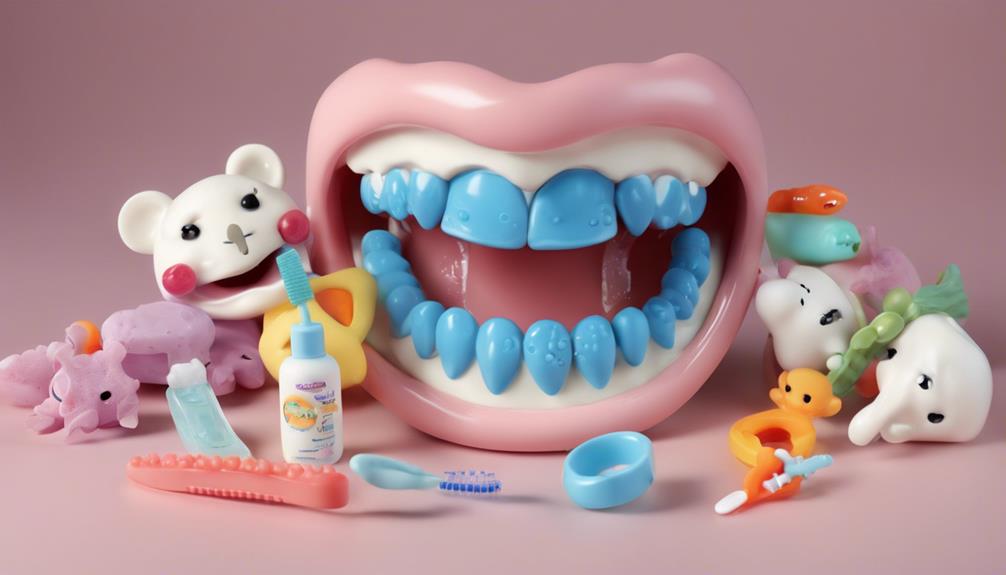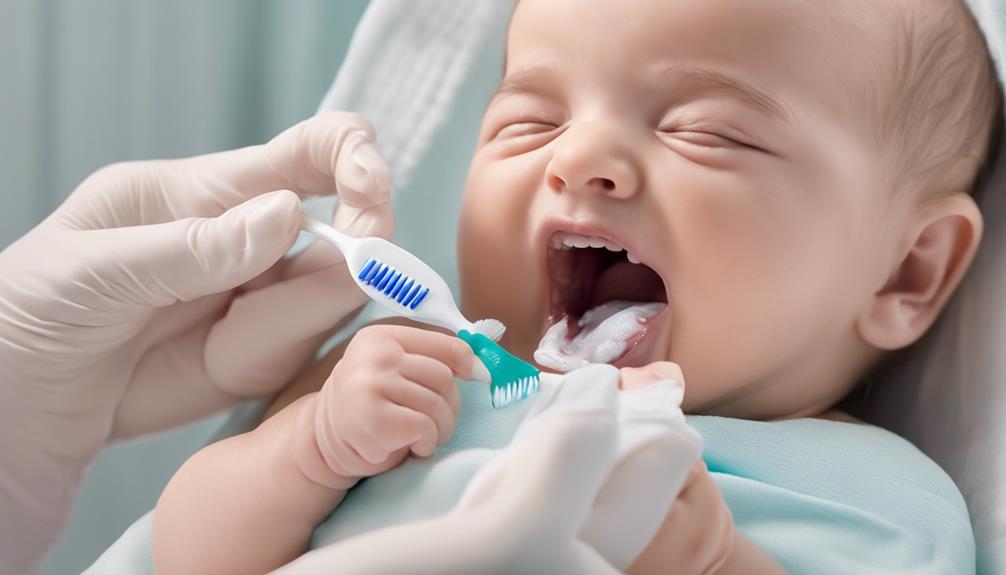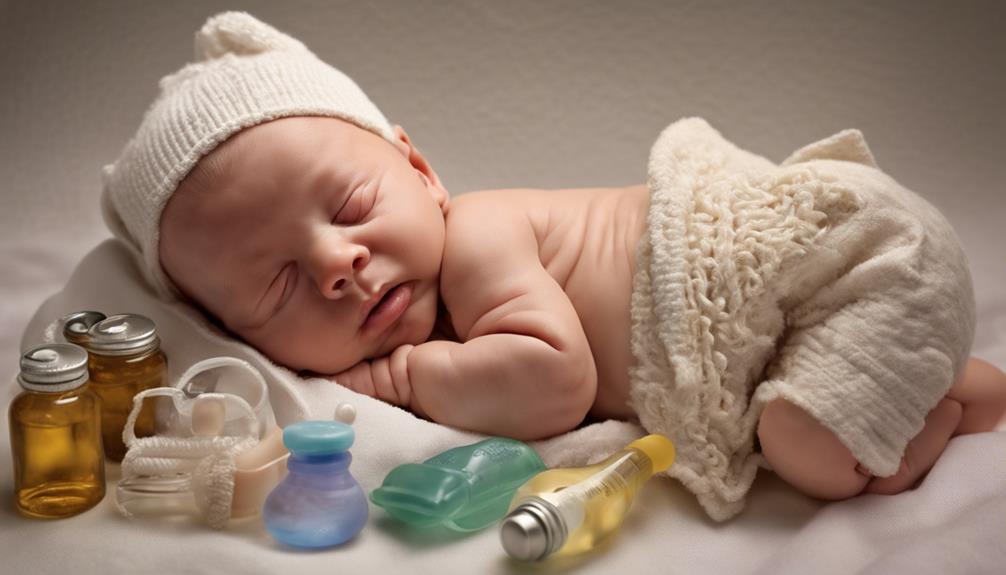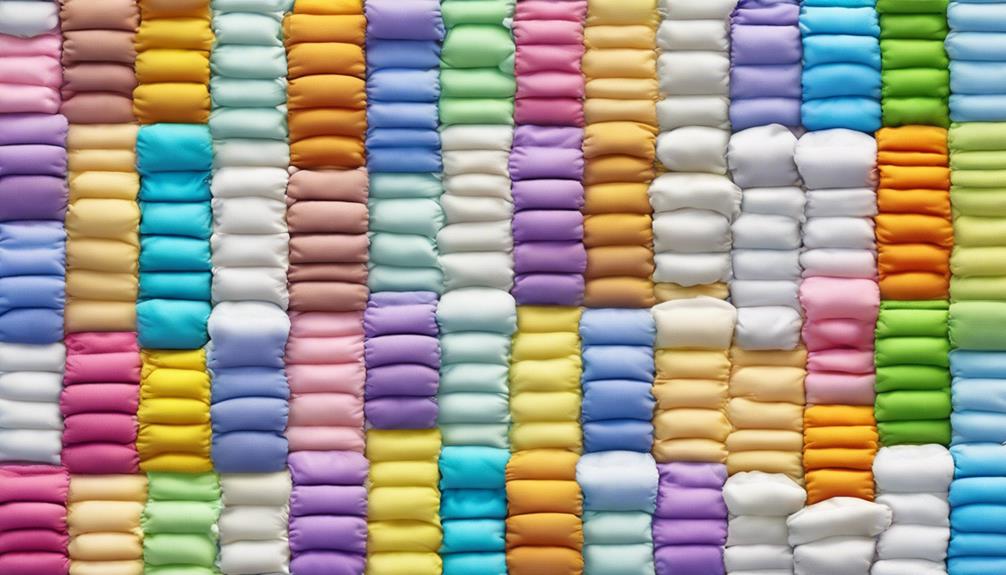The significance of maintaining good oral hygiene is widely recognized, and for babies, the early dental care they receive sets the foundation for a lifetime of healthy smiles.
From cleaning your baby's gums to introducing the first toothbrush, each step plays a vital role in their oral development.
But what about teething and preventing tooth decay? Let's explore these aspects further to make sure we're equipped with the knowledge needed to promote excellent oral health for our little ones.
Key Takeaways
- Start oral care early to establish lifelong habits and prevent dental issues.
- Use gentle cleaning techniques to promote oral hygiene and reduce infection risks.
- Introduce a soft-bristled toothbrush at the first tooth emergence for effective cleaning.
- Monitor teething signs and provide comfort measures to ease discomfort during this stage.
Importance of Newborn Oral Care
Newborn oral care plays an important role in safeguarding your baby's dental health and overall well-being. Taking care of your baby's mouth, gums, and emerging teeth is essential for establishing good oral health habits early on.
Baby teeth, although temporary, are necessary for proper chewing, speaking, and holding space for adult teeth. Neglecting infant oral care can lead to issues like early childhood caries, affecting not only the primary teeth but potentially causing problems for the permanent teeth as well.
Ensuring proper dental care from the start sets the stage for a lifetime of healthy smiles. Regular check-ups with a dentist after the eruption of the first tooth are important for monitoring oral health development, addressing any concerns promptly, and receiving guidance on effective oral care practices tailored to your baby's needs.
Cleaning Your Baby's Gums

To promote ideal oral health in your newborn, begin by gently cleaning their gums after each feeding using a soft, damp cloth or gauze pad. This practice is essential for maintaining oral hygiene and preventing bacteria buildup even before your baby's first tooth emerges. Here are some key points to think about when cleaning your infant's gums:
- Use a gentle wiping motion along the gums to make sure thorough cleaning.
- Regularly cleaning your baby's gums can help reduce the risk of infections and establish good oral hygiene habits early on.
- Cleaning your baby's gums can also provide relief from teething discomfort.
- Starting oral care from a young age sets the stage for a lifetime of good dental habits and promotes overall oral health in infants.
Introducing the First Toothbrush
When introducing the first toothbrush to your infant, select a soft-bristled brush and use gentle circular motions for effective cleaning. It's crucial to start this oral care routine as soon as the first tooth appears. Opt for a toothbrush with soft bristles to prevent any discomfort or damage to your baby's delicate gums. Remember to keep it simple by using water only at least twice a day.
By incorporating gentle circular motions, you can make sure that both the teeth and gums are cleaned thoroughly. This early introduction to proper brushing techniques will help your child develop good habits for lifelong oral health. Consult with a dentist to get guidance on selecting the right toothbrush and establishing a consistent oral care routine tailored to your infant's needs.
Taking these steps early on will set the foundation for a healthy smile and prevent potential oral health issues in the future.
Teething and Tooth Development

Teething typically marks the beginning of a significant phase in an infant's oral development, with most babies getting their first teeth around 6 months of age. During this time, you may notice your baby's first tooth coming in, leading to some common signs of teething such as drooling, increased biting behavior, and maybe even a slight fever. As the teeth start to erupt, being mindful of your baby's sore gums and providing comfort measures to ease any discomfort is crucial.
Here are a few tips to help you navigate through this stage:
- Use teething rings to soothe your baby's gums.
- Watch out for teething milestones like increased fussiness and irritability.
- Be prepared for the possibility of your baby falling asleep more often due to the discomfort.
- Remember that the teething process typically lasts around 8 days on average before the tooth fully emerges.
Preventing Tooth Decay
Practicing good oral hygiene habits from an early age is important in preventing tooth decay in newborns. Baby teeth are susceptible to decay as soon as they appear due to exposure to plaque and sugars. To prevent tooth decay in infants, it's important to avoid putting babies to bed with a bottle, as prolonged exposure to sugary liquids can lead to bottle decay. Refrain from dipping pacifiers in food, sugar, or honey to prevent early tooth decay. Instead, clean and sterilize your baby's pacifier to reduce the risk of harmful bacteria transfer. Early dental care and proper oral hygiene play a crucial role in preventing tooth decay in newborns and promoting overall oral health.
| Preventive Measures | Description |
|---|---|
| Avoid Prolonged Bottle Use | Prevents bottle decay by limiting exposure to sugary liquids. |
| Clean Pacifiers Properly | Reduces the risk of harmful bacteria transfer for better oral health. |
| Use Fluoride Toothpaste Wisely | Helps strengthen baby teeth, but use in moderation to prevent ingestion. |
Frequently Asked Questions
How to Do Oral Hygiene on a Newborn?
We clean our newborn's gums after each feeding with a damp cloth. Once the first tooth emerges, we switch to a soft brush and water. We introduce fluoride toothpaste when they can spit it out, using only a smear under 3 years old.
When Should I Start My Newborn's Oral Care?
We should start our newborn's oral care early, after each feeding. It sets good habits and helps prevent dental issues. Once the first tooth appears, we use a soft brush. The first dental visit is recommended by the first birthday or after the first tooth comes in.
How Do You Guide Oral Care?
We guide oral care by starting early with gentle gum cleaning. As teeth emerge, we brush twice daily with water and a baby-safe brush. Regular dental visits guarantee proper guidance and education on effective techniques, creating positive oral hygiene habits.
How Often Should You Clean a Newborn's Mouth?
We clean a newborn's mouth after every feeding to prevent bacterial buildup. Using a soft cloth or gauze, we gently wipe the gums before teeth appear. We brush the baby's teeth with a soft infant toothbrush at least twice daily.
Conclusion
To summarize, ensuring proper oral care for your newborn is essential for their overall health and well-being. By following the guidelines outlined in this guide, you can set a strong foundation for your baby's dental health.
Remember, a healthy smile starts from the very beginning. So, don't let tooth decay sneak up on you – stay proactive and keep those pearly whites shining bright like a diamond!










